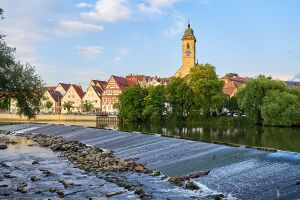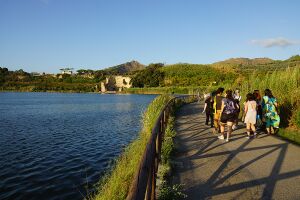WAVE Online Seminar 2021: Difference between revisions
| Line 22: | Line 22: | ||
*'''Download the [https://ilias.hfwu.de/goto.php?target=file_25116_download&client_id=hfwu 2020 Course PPT Presentation]''' | *'''Download the [https://ilias.hfwu.de/goto.php?target=file_25116_download&client_id=hfwu 2020 Course PPT Presentation]''' | ||
== Goals of the | == Goals of the WAVE Online Course == | ||
*In the light of the sensitive nature of | *In the light of the sensitive nature of water areas and their relevance to society, economy and the environment it is vital that planners and designers learn how to manage these territories in a sustainable way. WAVE Course participants will develop a profound understanding of the '''specific character of wate areas'''. They will learn which driving forces are influencing the '''water landscape system''' and which impact types are most relevant for planning and design responses. This includes the global and European dimension since water areas are receiving increased attention worldwide. | ||
* | *Learning in the WAVE programme is both theoratical and practical. The WAVE online course presents the theoretical and methodical foundations for sustainable planning and design of water areas. In parallel, participants engage in the WAVE Living Labs and learn how to involve local community into rhis learning process. | ||
*Different '''approaches to strategy building, planning and design''' in the context of coastal landscapes will be introduced in the last phase of the course. On this basis, the course participants will be able to draft a strategy and a master plan for a coastal area taking economic, ecological and social aspects and current policies into account. | *Different '''approaches to strategy building, planning and design''' in the context of coastal landscapes will be introduced in the last phase of the course. On this basis, the course participants will be able to draft a strategy and a master plan for a coastal area taking economic, ecological and social aspects and current policies into account. | ||
*In addition to the subject specific knowledge and methods the | *In addition to the subject specific knowledge and methods the WAVE course further aims to foster '''transversal skills''' at various levels. This includes above all the following: virtual team work and creative application of ICT tools for international cooperation, team building and democratic leadership, analytical thinking, intercultural communication and creativity. | ||
*The | *The WAVE course wants to equip a future generation of planners and designers with relevant knowledge, methods and skills in order to '''transform our societies for sustainability'''. | ||
== Course Content == | == Course Content == | ||
Revision as of 09:16, 23 February 2021

An international online seminar offered by a European partnership of universities and NGOs
>>>Apply now
For whom is this course?
- Do you care about water?
- Are you an architect who cares about sustainable development?
- Are you an urban or landscape planner who wants to make planning and design more inclusive and strategic?
- Are you a geographer who wants to work with other disciplines on a globally relevant landscape challenge?
- Are you curious about other people and their knowledge?
- Are you eager to get to know people from other places – academics like you but also citizens and their local issues?
- Do you believe in your capability to create something new?
Then join us in the WAVE online programme and living labs!
Presentation
- Download the 2020 Course PPT Presentation
Goals of the WAVE Online Course
- In the light of the sensitive nature of water areas and their relevance to society, economy and the environment it is vital that planners and designers learn how to manage these territories in a sustainable way. WAVE Course participants will develop a profound understanding of the specific character of wate areas. They will learn which driving forces are influencing the water landscape system and which impact types are most relevant for planning and design responses. This includes the global and European dimension since water areas are receiving increased attention worldwide.
- Learning in the WAVE programme is both theoratical and practical. The WAVE online course presents the theoretical and methodical foundations for sustainable planning and design of water areas. In parallel, participants engage in the WAVE Living Labs and learn how to involve local community into rhis learning process.
- Different approaches to strategy building, planning and design in the context of coastal landscapes will be introduced in the last phase of the course. On this basis, the course participants will be able to draft a strategy and a master plan for a coastal area taking economic, ecological and social aspects and current policies into account.
- In addition to the subject specific knowledge and methods the WAVE course further aims to foster transversal skills at various levels. This includes above all the following: virtual team work and creative application of ICT tools for international cooperation, team building and democratic leadership, analytical thinking, intercultural communication and creativity.
- The WAVE course wants to equip a future generation of planners and designers with relevant knowledge, methods and skills in order to transform our societies for sustainability.
Course Content
The online module consists of twelve 90-minute sessions of lectures, reading materials, collaborative group work and other diverse active and passive learning tools.
The thematic elements of the course are designed to give students core knowledge for developing integrated planning and design approaches for coastal landscapes.
- Understanding Coastal Landscapes
- Evaluation and Assessment for Coastal Landscapes
- Integrated Planning and Design for Coastal Landscapes
Please also visit our reading list for further information.
Course Schedule: Online and On Site
- Online lectures will take place from 31.01. – 09.04.2020, with weekly sessions on Fridays from 15 00 – 16 30 pm CET.
- The intensive study programme in De Panne, Belgium, is scheduled for March 29 - April 7, 2020
Case Study Assignment
- As the participants advance through the three course phases they will work in parallel on a study on a coastal landscape of their own choice.
- They can conduct this study individually or in local teams. The team areas are accessible via the CO-LAND Working Groups page.
- The case studies will be documented with a case study template which is scaffolding this process.
- All along this process the individuals or local groups will collaborate with an international team. The interaction will consist of peer review, especially during phases 1 and 2, joint presentations and a joint planning and design process during phase 3.
- At the end of the seminar, the international teams will also reflect on their collaboration process and document their findings.
- In addition, there is a reading list for each session, participants are asked to study relevant materials in parallel to the course activities and add their theory reflections to the case study.
Conditions for participation and credits
Participation in this course is open to all spatial planning and design study programs and free of charge.
Academic recognition for successful completion will be as follows with a maximum of 8 ECTS:
- up to 5 ECTS for the online seminar (active participation)
- up to 8 ECTS for those who attend both the online course and the intensive programme
- Students need to seek individually for academic recognition at their respective universities
- there is usually at least one recognition opportunity at each university of the COLAND partnership
Preconditions for attending the workshop in Belgium
Successful participation in the online part is a requirement for participating in the intensive programmes in Begium. However, participation in the workshops is limited. Each participating university can offer five grants, covering travel and subsistence, and a limited number may participate on a self-paid basis.
Participant numbers
There is no set limit regarding the number of participants in the online course. Any interested student, graduate or young professional is invited to attend. All participants who successfully complete the assignment will be issued a certificate on behalf of the seven academic institutions involved. Passive, listen-only participation in the online course is also possible, but no certificate will be issued for this participation mode.
Registration conditions and deadlines
Registration Online Seminar
Participation in the online seminar is free and open to students at any institution as well as the general public.
Participation is possible in active or passive mode.
Active participation includes:
- registration before 15th of January 2020
- regular attendance of the online class (or working with the seminar recordings in due time)
- completion of the seminar coursework and group assignments
- academic recognition of up to 5 ECTS
Passive participation includes:
- registration can be done any time, but preferably before the first session.
- visitation of online seminar sessions either in real time or through video recordings;
- no academic recognition granted
Registration De Panne Workshop
Participation in the De Panne Workshop requires personal application. Only students enrolled at the partner universities are eligible for an ERASMUS travel grant.
Applications must include:
- Brief letter of motivation (max 1 page)
- Curriculum Vitae
- reference of language skills if available
Applications will be received until 15th of January 2020.
Registration Link
Key dates
Online course
- Online lectures will take place from 31.01. – 09.04.2020, with weekly sessions on Fridays from 15 00 – 16 30 pm CET
- Parallel group work in local and international teams
Intensive Study Programmes/Workshops
- The intensive study programme in De Panne, Belgium, is scheduled for March 29 – April 7, 2020
Further information


